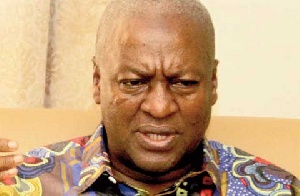Former President John Mahama has reiterated his aversion to the free Senior High School (SHS) policy, saying it will come under review if elected as president in 2020.
He hinted of the possible scrapping of the policy to allow for consultation before its reintroduction.
Former President Mahama said a proper timetable would be drawn after national consultation on the policy.
But President Akufo-Addo, who interacted with the Ghanaian community in Washington DC on Friday as part of his visit to the United States for the United Nations (UN) for the 73rd General Assembly, said free SHS policy has come to stay, warning that any attempt to tinker with the system by the future NDC administration would spell doom for the country.
Game-changer
“I am alarmed by this concept of review. This is because anytime our political opponents try anything of this sort; it leads the policy in question into coma. We all remember the NHIS One-Term premium payment review pledge. Not only did the review not materialize, but they also succeeded in degrading the policy,” the President declared.
He continued, “I honestly suspect reviewing the free SHS policy means collapsing it. But I doubt the Ghanaian people will allow this brilliant policy to be collapsed by anyone.”
Free SHS policy, he said, is a game-changer in the country’s development drive, explaining that Ghana needs an educated workforce.
According to Mr. Mahama, who has not hidden his disdain for the policy since the Akufo-Addo administration introduced it in 2017, the double-track system under the free SHS policy does not make sense.
Excessive Resources
Speaking to NDC supporters in Cape Coast as part of his tour of the Central Region ahead of the party’s presidential primaries, Mr Mahama explained that the introduction of the free SHS policy was ill-timed.
Under the policy, which was a major campaign promise of the New Patriotic Party (NPP), enrollment in secondary education has increased to 200,000.
Interestingly, the previous Mahama administration, during the 2016 electioneering campaign, trumpeted that he would fully start the free SHS policy if re-elected, raising questions about his sincerity.
He wondered why the current Akufo-Addo administration had committed excessive resources to the educational sector.
Former President Mahama also attributed the failure of the policy to the inability of the government to assemble experts and stakeholders at a national conference to deliberate on the policy.
Mr. Mahama disclosed that congestion in classes was evidence of the ill-planned free SHS policy, saying “Our NPP friends, they don’t listen to advice, they think they know everything.”
He criticized the double-track system that has been devised to ease congestion in schools to promote quality teaching.
“We just finished vacation. Children have been at home for nearly three months. It is time to go to school you say you have to stay at home for nearly 41 days and let your friends go.
“After 41 days, they will come home and sit down; it doesn’t make sense,” the former president, who is lacing his boots to contest the 2020 polls, added.
Nana Shocked
According to President Akufo-Addo, the Ghanaian people should be alarmed by the proposal of the NDC and its presidential aspirant, John Dramani Mahama, to review the free SHS policy which ensured that 270,000 more Ghanaian children gained access to senior high schools in 2017 and 2018.
The President said at the town hall meeting that the determination by some elements in the NDC to “review the free Senior High School policy, if voted into office, only means the eventual collapse of the policy.”
Explaining the rationale for the introduction of the free SHS policy, he stressed that prior to the implementation of the policy, an average of 100,000 Ghanaian students dropped out of school at junior high school level annually because their parents could not afford it.
“This obviously cannot be the level of education we dream of giving to our young generation in order for them to compete in the labour and ideas generation market that are excellently represented by continents such as Asia, America, Latin America, Europe, etc.,” he said.
“The decision, therefore, to implement the free SHS policy was a big decision because of its effect on our finances; I was particularly subjected to a lot of public ridicule.”
Naysayers
“The ‘policy is a hoax,’ the bearer is a liar, ‘it is undoable, ‘we need more time’, ‘it’s not a good idea, are just some phrases used, but this, obviously, is the nature of our politics so we understood.”
Double Track
As a result of the increase in enrollment, the President disclosed that his administration found a creative and innovative way of absorbing the large number of students, while at the same time putting in place a working plan to expand the existing infrastructure.
“I have always been encouraged by the attitude of Dr. Kwame Nkrumah, who took a decision on the grounds that empowerment of the young generation through education was very critical in nation-building even when there are challenges. He held the view that even though there were challenges, there was the need to still introduce the policy (Accelerated Development Plan for Education),” he said.
The President continued, “I naturally ascribe to the same school of thought that there may be few challenges, i.e. the high number with the introduction of Free SHS, and the high deficit in infrastructure at that level, nevertheless it is opening the gates for more young persons to have access. That’s exactly what we have done by introducing the double-track system.”
President Akufo-Addo insisted that there was absolutely nothing unusual about the double-track system, since it has worked very well in many countries that have practised it effectively.
To guarantee the success of the system, the President revealed that over 8,000 more teachers are being recruited to cater for the shortfall in teaching personnel.
General News of Monday, 1 October 2018
Source: dailyguideafrica.com













